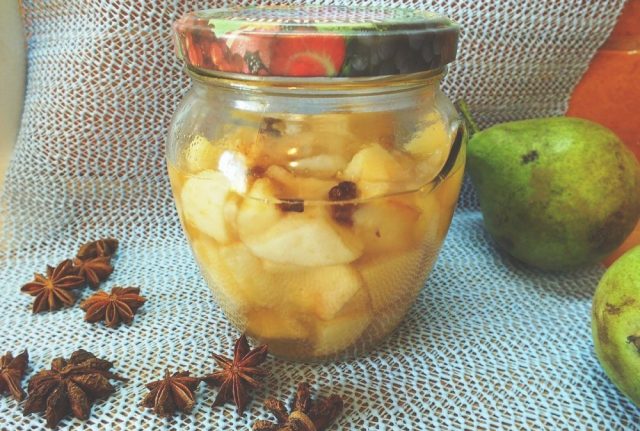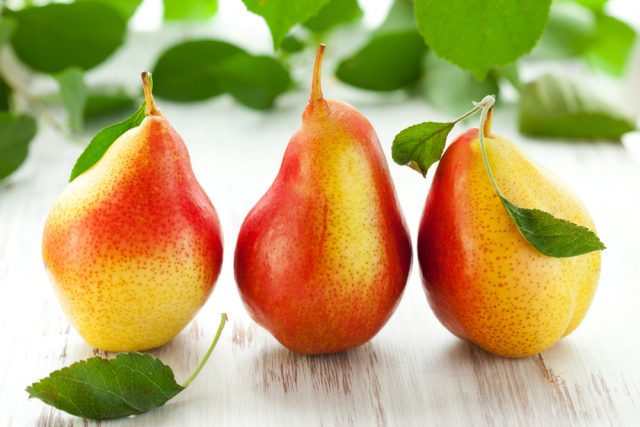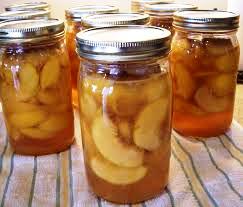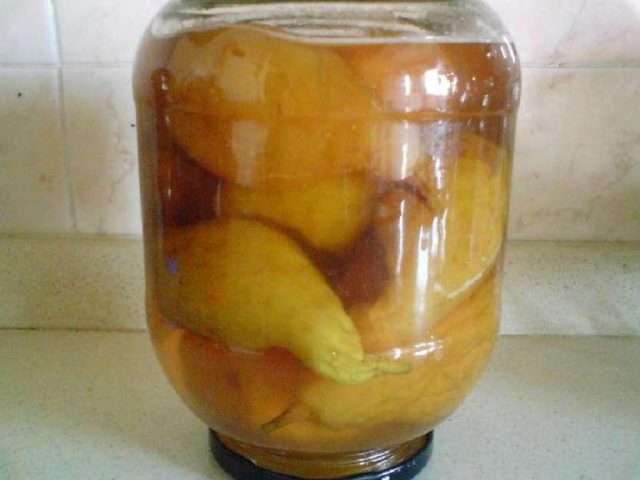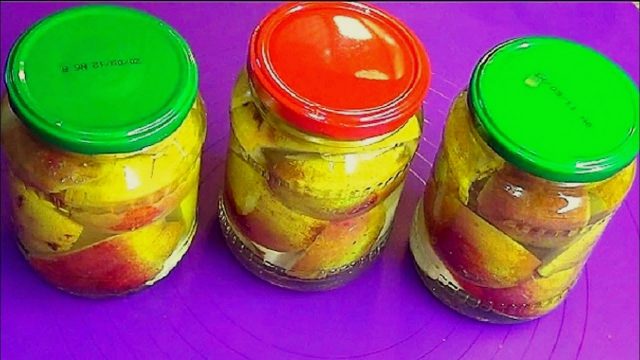Content
Aromatic pears in their own juice are a delicious dessert that will pleasantly surprise guests on evenings of winter holidays. The flavor of the fruit becomes more intense after canning. The useful microelements that make up the product are partially preserved (up to 90%). The fruit contains various vitamins (most of all vitamin C), Of the microelements in the first positions: folic acid, iodine and potassium. Therefore, doctors recommend including a juicy product in the diet to maintain human health and performance.
Features of cooking pears in their own juice
Before cooking, the raw materials must be sorted out and thoroughly washed. A spoiled product is not suitable for preservation. If the recipe requires it, the raw materials must be cleaned. When the skin does not come off well, the fruit can be used for 20 seconds. dip in boiling water.
Depending on which recipe is chosen, it is necessary to prepare cans with a volume of 0.5 liters to 3 liters. Smaller containers are suitable for slicing pears. If you make a seaming from a whole product, then it is worth preparing containers with a volume of 2-3 liters.
Banks should be carefully inspected for cracks and broken glass. Only a whole container is suitable for preservation. Then you need to wash it under running water using baking soda. The container must be sterilized. This can be done by holding the container over steam or in the oven. You need to take metal covers. They should also be washed and sterilized. Be sure to boil for a few minutes or pour over boiling water.
It is worth preparing a large pot in advance for sterilizing jars of pears in their own juice. It is necessary to pay attention that its walls are higher than those of the cans. The pot needs to be washed. Place a clean cloth or tea towel on the bottom.
After the glass container is filled with the future dessert, it must be placed in a large saucepan. Pour warm water over the shoulders of a glass container. Bring to a boil and keep for the specified time. For liter cans, it is 15-20 minutes, for three-liter cans - 30-35 minutes.
Fruit selection rules
Pay attention to the size of the pear. For harvesting the whole fruit, it is better to take medium-sized fruits so that it is convenient to stack them and take them out through the neck of the container. A small pear may deform during heat treatment, so it is not advisable to take it for such purposes. Large fruits can be used for harvesting, where the fruit is cut into slices.
The fruit must be ripe and always firm, so that during heat treatment it does not turn into porridge.
Pear recipes in their own juice for the winter
There are 2 main ways to preserve fruit in your own juice. You can cook:
- whole pears;
- cut into pieces.
Whole fruits are also prepared according to several recipes:
- with peel;
- without peel.
Pears in their own juice for the winter in pieces
A dessert made from pieces of the product has a very rich sweet taste.
Each housewife does the preservation in her own way, depending on how the fruit will be used in the future. Pieces can range in size from small bars or cubes to pears cut into quarters or halves.
Required Ingredients:
- pears - the amount depends on the volume of the selected container;
- granulated sugar - 2 tbsp. l .;
- citric acid - on the tip of a knife.
Ingredients are indicated per 1 liter container.
Recipe for cooking fruit, canned in its own juice, in pieces:
- Peel the pear. Cut out the core and seeds.
- Cut the fruit into wedges or cubes of the desired size.
- Put the pear quite tightly in sterilized jars up to the shoulders. Try not to break the pieces.
- Add sugar and citric acid.
- Cover with metal lids (do not tighten).
- Put to sterilize in a prepared saucepan.
- Wait until the juice is released. If it is not enough, then it is worth adding a little boiling water.
- After sterilization, carefully remove the jars from the boiling water.
- Roll up immediately.
- Turn over and wrap with a warm blanket.
- After complete cooling, remove to a cool, dark place.
By the same principle, you can cook whole pears in their own juice without the peel. Usually they are placed in a container with a volume of 3 liters. Sterilized for 30-35 minutes.
Whole pears in their own juice
Fruits, canned as a whole, retain more vitamins. The taste is also different from the sliced pear. This dessert is served as a separate dish. Taking a bite of a whole pear, you can at least briefly recall the warm summer days and warm up thanks to pleasant memories in winter.
Ingredients for a 3L can:
- pears - about 10 pcs. medium size;
- sugar - 1 tbsp.;
- citric acid - 1 pinch;
- water - 1-1.5 l.
Recipe:
- Wash pears thoroughly. Remove ponytails.
- Fold the fruit into a 3 L jar.
- Combine water with sugar. Boil to obtain syrup.
- Pour sweet liquid into a jar with pears. Let stand for 10 minutes. to extract juice from fruits.
- Drain the flavored syrup back into the pot where it was originally boiled.
- Add citric acid to the sweet liquid. Boil.
- Pour the syrup back into the pear container.
- Roll up quickly. Turn over and wrap.
How you can use pears in your own juice
Whole-cooked pears can be served as a separate dessert. They always delight adults and children with their aroma and taste.
The housewives use the pear in its own juice, cut into pieces, as a filling for pies and cheesecakes. The fruit goes well with cinnamon. Therefore, they are often combined.
The pear, cut into wedges in its own juice, can be used to make jellies and beautiful desserts. The fruit is served with delicate cottage cheese, natural yogurt.
Juice from the can will also not be overlooked. You can drink it, diluted to taste with boiled chilled water.
Terms and conditions of storage
It is advisable to store jars of pears in their own juice in a cool, dark place. A cellar is ideal. But, as practice shows, conservation is well worth it in apartment conditions (in a storage room, on a balcony under a curtain or on shelves). The shelf life of such conservation is 3 years. But usually such a delicacy is sold out in the first cold months.
An open jar must be put in the refrigerator. Replace the metal cover with a clean nylon cover. To prevent the pear from fermenting in its own juice, it is worth taking it out of the jar with a ladle. Be sure to keep it dry and clean. When opened, a can in the refrigerator can stand for a whole week.
Conclusion
Pears in their own juice are a real find for a good housewife. Such a dish will pleasantly surprise even the most capricious guest.It is important to remember that a fragrant dessert is not only very tasty, but also very healthy.
